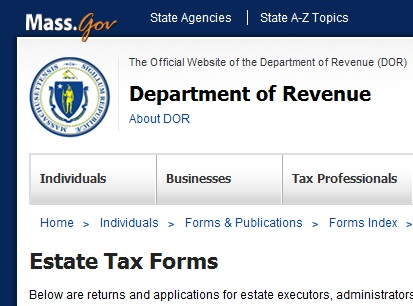
As we described in an earlier article, calculating the Massachusetts Estate tax (imposed on estates over about $1 million) is not an easy task. So it should be no wonder that families find it difficult to form an estate plan that incorporates a Massachusetts estate tax strategy. Actually avoiding such a tax (also called the death, inheritance or succession tax) is not very difficult, since the methods are fairly straightforward. Determining your estate planning goals is where the major brainstorm comes in, and where an experienced Massachusetts estate attorney can make the difference. But enough of the sales pitch, here are some of the methods that we use:
Lifetime Gifting and $13,000 – The Magic Number

To begin with, Massachusetts has no gift tax. But under IRS rules there is a limit to the amount someone can give each year – and that is $13,000. Any gift valued above that triggers the requirement for the donor to file a gift tax return. There is no tax due at the time of the gift, but if an individual gave $14,000 to a friend for example, the extra $1000 would be entered in the IRS database, reducing his estate tax exemption (up to a $5 million estate in 2012) by the same amount. This exemption – that combines the lifetime gift tax exemption and the death tax exemption – is called the “unified credit.”
Please take note that many of our MassHealth (Medicaid) long term care clients mistakenly believe that they can give away up to $13,000 per year for a Medicaid spend down to qualify for benefits. This is not true, and in fact a gift of any amount will be deemed a disqualifying transfer for those seeking long term care benefits. Information on Medicaid and spending down is featured in our MassHealth guidance, or contact us on the web directly for expert Medicaid advice.
The Split Gift Provision – Doubling Your Gifts
While it is simple to understand the basic gift tax exemption, knowing the details and nuances of this exemption can be even more valuable. As we discussed before, the goals and circumstances of each family is different, meaning different options are available. For instance, if a married couple would like to make a gift, they may in effect double the amount. Furthermore, each donor can use this exemption for as many donees as he or she would like. How does this play out in practice? Well, for example, a mother and father could each give $13,000 to their son, his wife and their single grandchild every year without triggering the gift tax return requirement. By doing so, the couple is able to give up to $78,000 away each year without triggering the gift tax requirement! A couple with more children could give more still. Naturally, this is a frequently used tool for those with larger estates.
For families with assets well over the estate tax threshold, other options exist. Creating limited liability entities to hold these assets is a strategy that many attorneys employ to reduce the assets’ market value. In a simple example, a piece of real estate could be placed in an LLC or S Corp, whose members have little to no voting rights. The absence of these voting rights mean that few outside investors would want to purchase any interests, bringing their market value down. Because of this unique “family business” structure, the parents are free to give away such real estate interests having a reduced market value, but the children holding those assets after their parents’ death could sell the asset for a higher actual value.
Avoiding Massachusetts Inheritance Tax with the Marital Deduction:

In Massachusetts, just like at the federal level, upon death there is no estate tax due – when everything passes from one spouse to another. This protection is afforded in consideration of the fact that many married couples consider their major assets to belong to both of them. Imagine, for example, if a wife had to sell the family home that they’d lived in together all their lives, simply because its value triggered an estate tax. Instead, both Massachusetts and federal tax laws permit surviving spouses to inherit an estate of any value without any estate tax liability.
.
Massachusetts Bypass Trust Succession Tax Strategies
In addition to using the marital deduction, couples can use more complex estate planning vehicles to ensure that both spouses of the marriage are able to use the maximum estate and/or gift tax exemptions available to each. As we discussed before, the Massachusetts estate tax applies to estates over $1 million. And again, just as the federal gift tax (unified credit) exemption is available to each spouse, so too is the Massachusetts estate tax exemption. We’re therefore able to exempt up to $2 million from Massachusetts death tax liability, if planned well.
This brings us to the concept of a Massachusetts bypass or family trust. What that means, in essence, is that the trust is reserved only as a benefit for the surviving spouse during life (e.g. it will provide interest income), but that it will terminate and pass to other beneficiaries afterwards. Any funds from the estate of the first spouse to die would go into this trust rather than outright to the surviving spouse. In certain Massachusetts estates that exceed $1 million, this tool can be quite useful.
As an example, let’s assume that a couple together are worth $2 million. The husband could pass away and leave his half outright to his wife, leaving her alone with $2 million. But if she were to pass away leaving such an amount, their children could lose a significant sum from the estate tax on that entire amount! Instead, our Massachusetts estate planning attorneys might have achieved the following:
- Leave half of the estate in a family trust up to the $1,000,000 Massachusetts estate tax amount (perhaps the family home and an amount of money in an investment portfolio). The wife has a right to the income during life, but the children are the ultimate beneficiaries.
- Leave the remaining $1,000,000 to the wife outright, a sum that should allow her to live as comfortably as before, and that qualifies for her estate tax exemption when she passes away.
Both spouses in the above situation utilized their maximum individual estate tax exemptions, and the surviving spouse had the ability to remain in her house, while still having plenty of funds in her own name. Again, such a trust could contain the family home as well as some investments, providing modest income during her life.
Using the “Q-TIP Trust” in a Massachusetts Estate Plan
Another, more complex estate tax avoidance strategy developed in Massachusetts is the Q-TIP Trust. Good to know, but not necessarily helpful in understanding this trust is that the acronym Q-TIP stands for Qualified Terminable Interest Property. This trust would be used in Massachusetts estates that exceed $2 million.
It is difficult to summarize article how exactly the Q-TIP trust works as part of a greater article on the various Massachusetts estate tax avoidance strategies. But readers should be aware that this is one planning tool that provides the greatest Massachusetts succession tax benefit, while also helping to preserve the greatest federal unified credit, which happens to be a more volatile figure given the actions of Congress these days. Anyone with funds nearing this amount should call our offices for an appointment for a more in-depth description.
Creating an Irrevocable Trust as an Avoidance Strategy
Our last Massachusetts estate tax avoidance tool is comparatively easy to understand from some of the others we’ve talked about, but their use is so varied that again, an article such as this can’t really summarize them well. Generally though, assets are placed in an irrevocable trust during the life of the donor so that they are not includible in the taxable estate.
The drawback to irrevocable trusts, of course, is that they are not revocable. This means that any assets placed within them are then under the control of the trustee, who may not be so friendly as to give them back to the donor in the event they are needed. In fact, irrevocable trusts are mainly used in situations that require the donor have little or no say in their proceeds. Homes, bank accounts, and even life insurance policies are examples of assets that people put in trusts.
Final Thoughts – Maintaining the Massachusetts Estate Attorney Relationship
No matter what size a family’s estate happens to be, a family’s assets tend to increase over time. Keeping in touch with the family estate attorney should be on the schedule at least every 4-5 years. So feel free to call our Sandwich law office for Massachusetts estate tax questions whenever you have a question.





